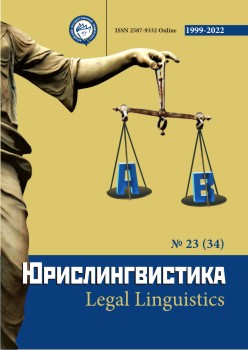Is the Lexeme “Khach” Offensive?
Abstract
The article discusses the study of the lexeme “khach” in the functional aspect. In forensic linguistics practice, one often has to deal with ethnopholisms. The lexeme “khach” is quite typical of controversial texts on ethnic topics. Its derogatory nature is not obvious to all forensic linguists. We consider this lexeme offensive and support our point of view. The author of the article disputes the phonosemantic interpretation of the negative attitude of native speakers to the lexeme “khach”: it seems to repel with its sound, unlike the name Ivan in the same function of the ethnonym. The author of the article gives examples of how the name Ivan evokes unpleasant emotions in a Russian person, as well as clearly positive connotations associated with names consisting of the same sounds as "khach". It is also impossible to agree with the opinion that the ethnonym “khach” is explained by the theory of lacunarity, that is, by the fact that there are no commonly used words to denote the residents of the Caucasus. Russian Russianодноубрать has the word “kavkazets” (Caucasian), which has not gone out of use at all, which is confirmed by the National Corpus of the Russian language. The lexeme “Khachik” is not pejorative but diminutive if it is a proper name. However, speakers avoid using even this form because of its negative associations. Generisizedvariants as unofficial names of an ethnic group or groups are delicts (torts), gross violations of speech etiquette. Morover, it does not necessarily refer to a certain – Armenian – people. In addition, such unofficial ethnonyms are associated with stereotypes, often derogatory for the named peoples.
Downloads
Metrics
References
Баранов А.Н. Лингвистическая экспертиза текста. М., 2009.
Бердникова Т.В. Семантика слов с элементом черн- и их оценка при проведении лингвистической экспертизы (на материале комментариев интернет-пользователей) / Юрислингвистика.–2019.– № 12. –С. 18-21. – URL: https://cyberleninka.ru/article/n/semantika-slov-s-elementom-chern-i-ih-otsenka-pri-provedenii-lingvisticheskoy-ekspertizy-na-materiale-kommentariev-internet-polzovateley/viewer.
Большой толковый словарь русского языка. / Гл. ред. С. А. Кузнецов. СПб., 1998. Публикуется в авторской редакции 2014 года. URL: http://gramota.ru/slovari/
Быкова Г.В. Оскорбительны ли слова «хачик», «хач»? / Юрислингвистика-9: Истина в языке и праве: межвузовский сборник научных трудов. Кемерово, Барнаул, 2008. С. 292-297. URL: https://cyberleninka.ru/article/n/oskorbitelny-li-slova-hachik-hach-1/viewer.
Грачев М.А. Словарь современного молодежного жаргона. М., 2007.
Елистратов В.С.Словарь русского арго (материалы 1980–1990 гг.). URL: http://gramota.ru/slovari/argo/
Ефремова Т.Ф. Новый словарь русского языка. Толково-словообразовательный. М., 2000. URL: http://traduko.lib.ru.
Журавлев А.П. Фонетическое значение. Л., 1974.
Зиянгирова Е.Л. Юридизация лексем естественного языка как один из основных процессов терминологической лексики метаязыка юрислингвистики / Вестник Башкирского университета. – 2019. – Т. 1. – № 3. – URL: https://cyberleninka.ru/article/n/yuridizatsiya-leksem-estestvennogo-yazyka-kak-odin-iz-osnovnyh-protsessov-terminologicheskoy-leksiki-metayazyka-yurislingvistiki/viewer.
Коростелева Т.В. Экстремистский дискурс: признаки, иллокуция, прагматика / Юрислингвистика. 2015. URL: https://cyberleninka.ru/article/n/ekstremistskiy-diskurs-priznaki-illokutsiya-pragmatika/viewer.
Магерамова Ю.Ю. Правовые и лингвистические противоречия в трактовке понятия «оскорбление» / Научный диалог. – 2018. – №7. – С. 93-102. – URL: https://cyberleninka.ru/article/n/pravovye-i-lingvisticheskie-protivorechiya-v-traktovke-ponyatiya-oskorblenie/viewer.
Макаров В.И. Национальные прозвища в зеркале контекста / Вестник Новгородского государственного университета им. Ярослава Мудрого. – 2015. – URL: https://cyberleninka.ru/article/n/natsionalnye-prozvischa-v-zerkale-konteksta/viewer.
Национальный корпус русского языка. URL: https://ruscorpora.ru/new/
Стернин И.А. Неполиткорректные наименования лиц в языковом сознании носителя языка / Политическая лингвистика. 2013. URL: https://cyberleninka.ru/article/n/nepolitkorrektnye-naimenovaniya-lits-v-yazykovom-soznanii-nositelya-yazyka/viewer.
Унбегаун Б.О. Русские фамилии. М., 1989.
Щербинина Ю.В. Вербальная агрессия. М., 2006.
Copyright (c) 2022 Александр Флоря

This work is licensed under a Creative Commons Attribution 4.0 International License.
The authors, which are published in this journal, agree to the following conditions:
1. Authors retain the copyright to the work and transfer to the journal the right of the first publication along with the work, at the same time licensing it under the terms of the Creative Commons Attribution License, which allows others to distribute this work with the obligatory indication of the authorship of this work and a link to the original publication in this journal .
2. The authors retain the right to enter into separate, additional contractual agreements for the non-exclusive distribution of the version of the work published by this journal (for example, to place it in the university depository or to publish it in a book), with reference to the original publication in this journal.
3. Authors are allowed to post their work on the Internet (for example, in a university repository or on their personal website) before and during the review process of this journal, as this may lead to a productive discussion, as well as more links to this published work (See The Effect of Open Access).











